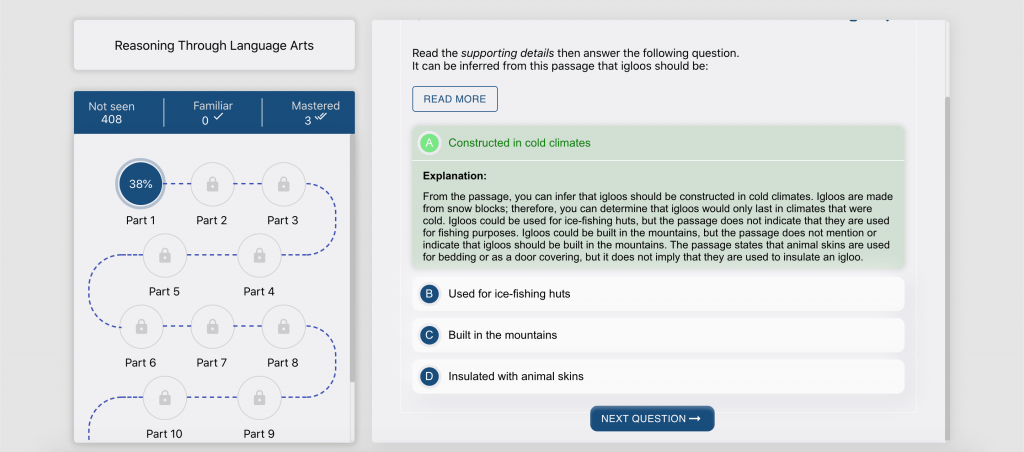Reading and writing are important skills to have not only for academic and professional studies but also for everyday life. Your ability to read and write well demonstrates your ability to express yourself logically and effectively, as well as think critically about the information you consume. As a result, the GED Reasoning Through Language Arts (GED RLA), also known as the GED Language Arts portion, has included these skills in their test in order to prepare you for a college or professional environment. However, you should not be concerned about the exam because this GED Language Arts study guide will provide you with all of the information you need to pass the exam and obtain a GED certificate.
What’s On The GED Reasoning Through Language Arts Test?
There are three specific aspects you will be tested on the GED Reasoning Through Language Arts exam including reading (read efficiently and critically), writing (identify and create arguments, write coherently), and grammar and language. The GED RLA test has around 46 to 53 questions which vary in types such as multiple-choice, fill-in-the-blank, drop-down, drag-and-drop, and extended-response. The test lasts for 150 minutes (2.5 hours) and you will have a 10-minute break between sections 2 and 3.
Section 1 and 3 will test all content. You have 35 minutes to complete section 1, and 60 minutes to finish section 3. Both of these sections will test content. The length of reading comprehension text is usually 450-900 words. Section 2 is the essay part of the test and you must finish it in 45 minutes. This part will give you two short passages with opposing views on a topic. You will be asked to read these passages and then choose which argument is better supported.
There are two types of materials that you will read on the GED Reasoning Through Language Arts exam. The first one is information text which accounts for up to 75% of the test questions, are the text from the workplace and non-fictional content. The second one is literacy text which accounts for 25% of the test. To be able to answer the question, you need to read, analyze, and apply the information from the texts.
To pass the GED Reasoning Through Language Arts exam, you need to know what knowledge categories you will be tested on the test. Below is the list of topics we have prepared for you:
Section 1: Reading for meaning
- Events, plots, characters, settings, and ideas
- Understanding main ideas and details
- Point of view and purpose
- Tone and figurative language
- Organizing ideas
- Comparing different ways of presenting ideas
Section 2: Identifying and Creating Arguments
- The relationship of evidence to main ideas and details
- Drawing conclusions, making inferences, and evaluating evidence
- Data, graphs, or pictures as evidence
- Extending your understanding to new situations
Section 3: Grammar and Language
- Word usage
- Sentence structure
- Transition words
- Capitalization, punctuation, and apostrophes
Read more >> GED Social Studies Study Guide In 2025
FAQs About The GED RLA Test
Is the language arts GED test hard?
Because Language Arts is a multifaceted subject, the GED Reasoning through Language Arts exam is also made up of various components. Furthermore, you must complete the test under time constraints. As a result, the test is fairly difficult; however, it may be easier if you study and prepare for the GED RLA test using quality resources.
How many questions can I miss on the Language Arts Test?
The number of questions you can miss on the GED RLA depends on your score essay. If your essay score is high, you will need fewer correct answers and vice versa. Basically, if you get 100% on your essay, you can miss 31 multiple choice answers, and if you get 0 on your essay, you can miss 19 multiple choice answers. In general, to pass the GED RLA test, you must answer correctly between 32 and 42 questions. Let’s take our free GED Language Arts Practice Test to get ready for your coming exam!
How will my essay be graded?
Your GED Reasoning Through Language Arts will be graded on three elements including:
- How you analyze arguments and use evidence
- How you develop ideas and structure
- How clear you are in expressing your ideas to check your command of Standard English
How long is the GED Language Arts Test?
The GED Reasoning Through Language Arts Test lasts for 150 minutes (2.5 hours) with a 10-minute break between sections 2 and 3.
How can I pass my GED essay:
Although you don’t know what essay topics you will be asked on the GED RLA, you should know what makes for a good essay for sure. Ideally, your essay should:
- Respond to the prompt. Remaining focused on the topic while you write.
- Be organized. Your writing should have a clear introduction, body, and conclusion.
- Have supporting details. It’s necessary to give examples from the reading and explain how they connect to the main idea.
- Use correct grammar and punctuation that make your essay easy to read.
- Use good word choice. You should avoid using words that are too informal or uncommon, and avoid repeating words.
- Use good sentence structure. You shouldn’t use overly complex sentences; still, you should vary your sentence structure.
GED Tips and Tricks
To pass the GED Reasoning Through Language Arts Test, you should not only study for the test but also know how to use tips and tricks while taking the test. Below are ten GED Language Arts Test tips you should apply:
1. Read the questions carefully
Many students often fall into traps as they read the questions too fast. Therefore, you should read each question carefully twice before answering or looking at the answers. Reading the answers carefully, at least twice, is also necessary. A question is often missed simply because students misread some terms.
In addition, you should keep in mind that don’t read the RLA questions too much. They are usually pretty straightforward than you think, and if you read them too much, you may be misunderstanding the common meaning. The best answer is your common sense.
- Answer the easy questions first
When you meet with difficult questions and don’t know what is the right answer, you should skip them. Wasting time on these questions is useless, instead, you should move ahead and answer the questions you know the answers to for sure. Because you must finish the test in the allotted time, so answering the easy questions first is right. Once you have finished all the questions that were easy for you, you can go back to hard questions and try to answer them. Other questions may give you hints and make you more confident with your choices.
- Use lots of practice tests
The best way to learn for the GED Reasoning through Language Arts exam is to practice. Once you take our GED practice test 2025 and read our GED Study Guide, you will be more familiar with the test format, and time limitations, and know clearly what could be asked on the test.
Our test has helped thousands of candidates pass their GED test easily. You can practice with thousands of free GED practice questions on our website or download our app on your phone. Let’s start now!

- Do not jump to conclusions
Some of the GED RLA questions will require pretty careful analysis. Therefore, when you first look at the question, don’t choose the answer immediately as some wrong answer will appear to be correct at a first casual glance. This is a sort of trap when writers of the GED test often put a misleading answer first. When you read a complex piece of text, recognizing the main idea is extremely important because it helps you find the correct answer easier.
Sometimes, you’ll meet questions that you find there are more than one correct answer. In that case, you should select the best answer option based on what the question asks, not on your assumption.
5. Use more formal language
Many examinees are familiar with informal languages that they use when speaking or texting with friends, then they write these slang or abbreviations on their essays that make their essays deducted points. Keep in mind that using more formal language as the essay’s score is based on how well you use English language conventions. Your essay must be correct in grammar, word choice, sentence structure, and tone.
- Answer all of the questions
While you take the GED RLA exam, make sure that you complete all the tests. Even for questions that you don’t know the right answer to, you should guess and select one option. This test does not penalize for guessing or wrong answers. When you need to guess, you can eliminate one or two options that are definitely incorrect. Then, the options come to only two and you have a higher ability to choose the correct one.
- Eliminate obviously wrong answers
Reading the questions carefully, then looking at the answers, there will be some of them that are definitely wrong. By eliminating wrong answers, you can be more concentrated on the options that have the higher correct ability. Look carefully at the questions that are matching the questions’ context clues, you can get the right answers easier.
- Keep an eye on the clock
Although the GED Reasoning through Language Arts exam has been calculated to give examinees enough time to finish all parts of the test. You should be careful about the time and keep your eye on the clock. You should distribute your time properly, and avoid wasting too much time on the questions which you are not sure about the right answer. On the other hand, for questions you know for sure, you also shouldn’t rush through them, read them carefully and select the best option.
- Edit and proofread your extended response
You should spend your last 10 minutes proofreading your extended response. This is a very significant step as you can find your spelling mistakes, grammar errors, and perhaps unclear statements while you check your writing. By proofreading, you can correct your mistakes immediately.
- Trust your instinct
Once you’ve decided on the answer you believe is correct, don’t overthink your decision. This action not only consumes your time but also increases your stress. You might even want to change the option that is currently your best choice. Furthermore, you will not have time to go over the answers that have obvious errors at the end.
Click HERE to download the official GED Language Arts Study Guide.
Eligibility Requirements For GED In District of Columbia
November 25, 2022

Eligibility Requirements For GED In New York
November 25, 2022

Eligibility Requirements For GED In Wyoming
You may learn more about how to obtain a GED in Wyoming by reading the answers to the questions related to GED requirements in Wyoming we receive below.
September 19, 2022

